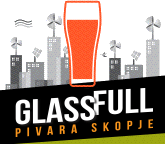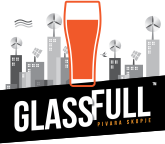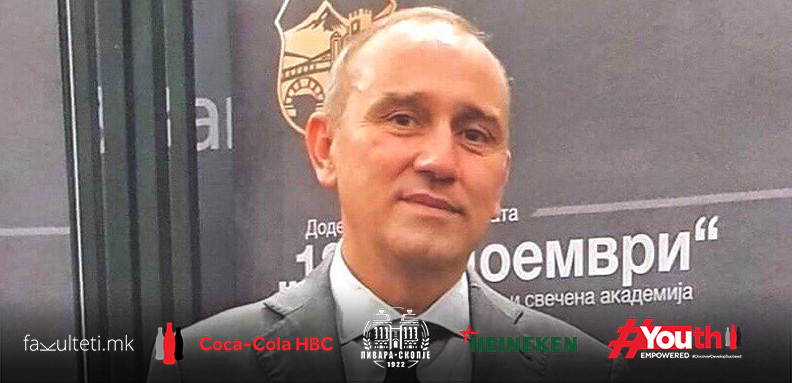
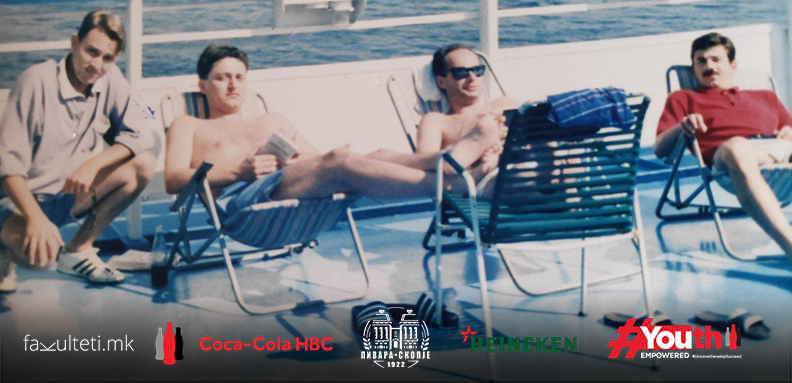
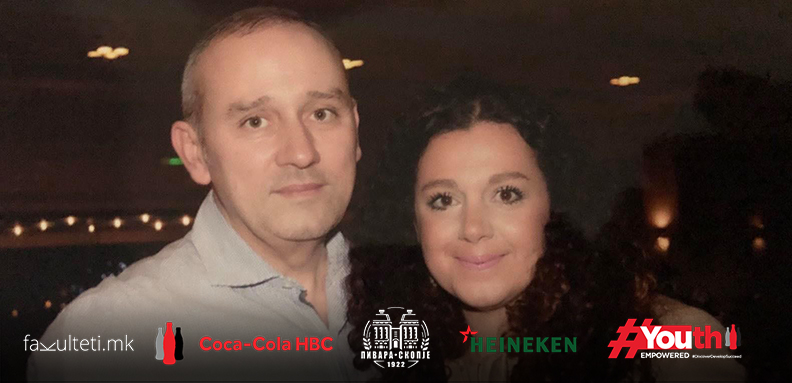
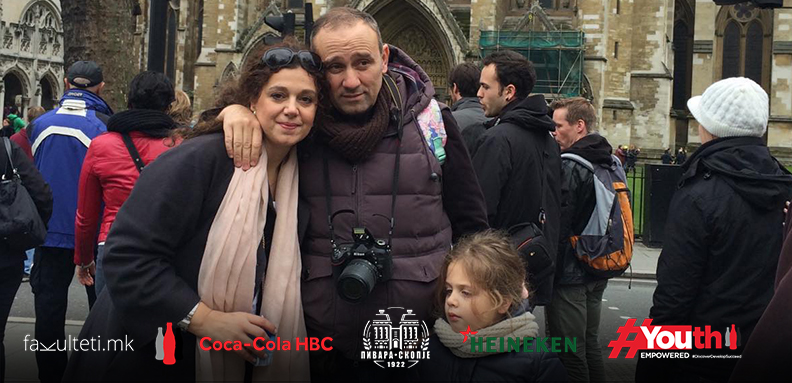
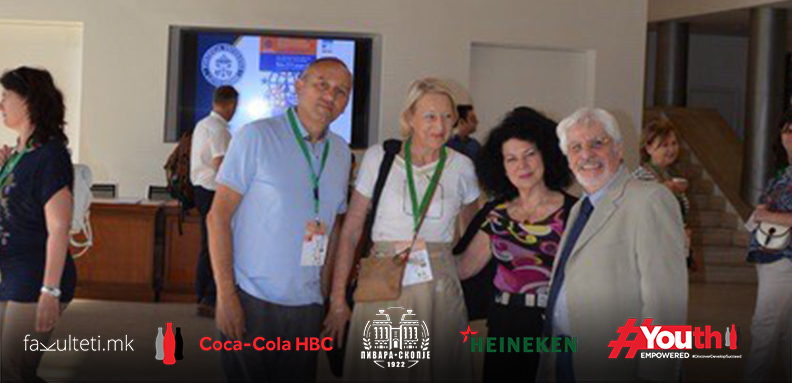
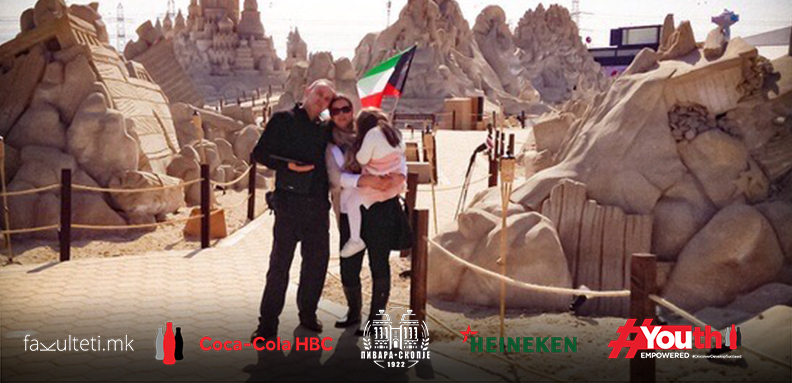
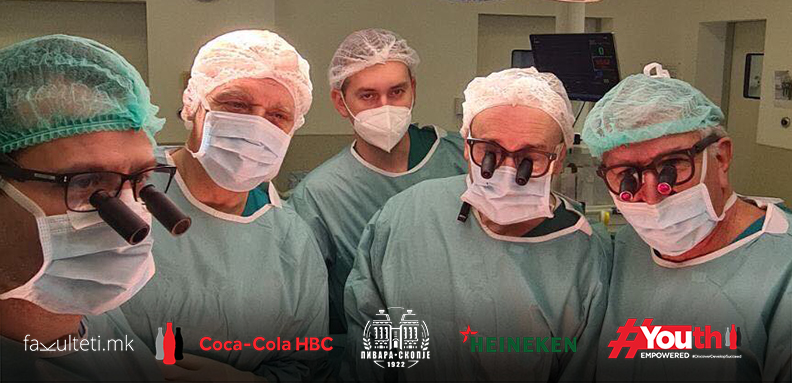
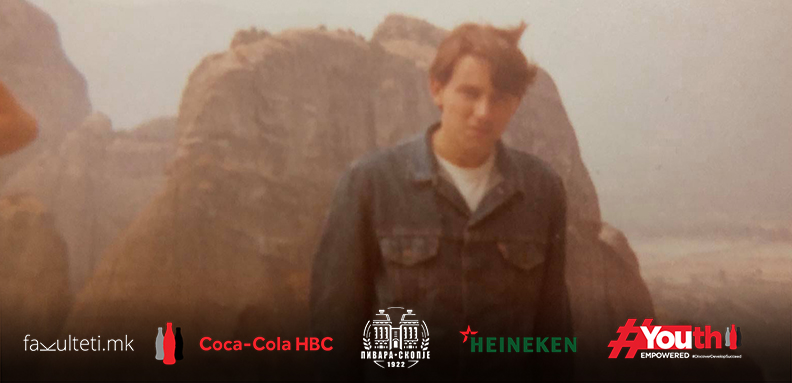
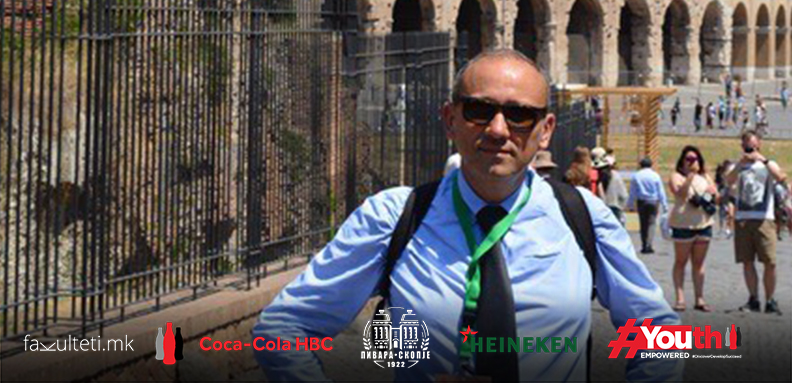
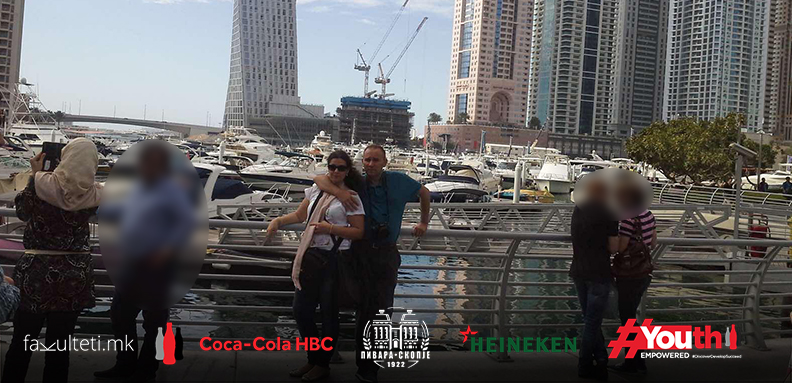
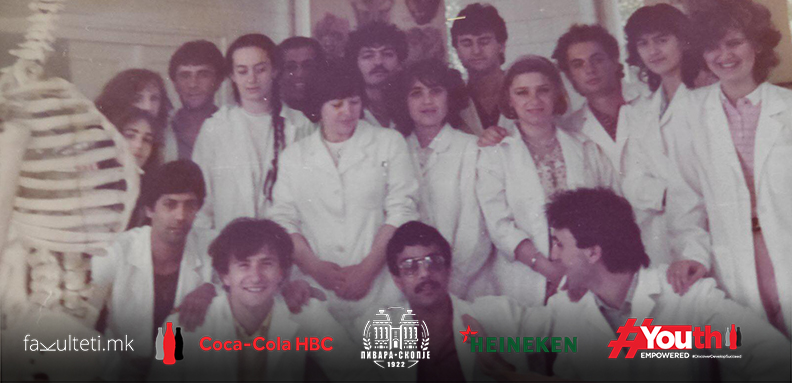
“WHEN I WAS A STUDENT” WITH PROF. DR. SASHKO JOVEV: MY ADVICE FOR YOUNG PEOPLE IS TO DREAM BECAUSE DREAMS DO COME TRUE, TO LEARN BEHAVIOR, CULTURE AND CRAFTS FROM ELDERLY
Prof. Dr. Sashko Jovev is one of the leading cardiac surgeons in the country – he realized significant achievements in the field of cardiac surgery and led the team that performed both heart transplants in this country. That, as he says, is the crown of his personal professional engagement, but also the crown of the Macedonian healthcare.
The decision to choose medicine, what were his most common thoughts about the future at the end of high school and college days, the balance between studying and the need of every young person to maintain friendships and socializing, are the most important memories of prof. Dr. Sashko Jovev, an eminent Macedonian heart surgeon, who looks back at his student years 3 decades later, when it was much harder to study medicine.
Prof. Dr. Sashko Jovev is one of the leading cardiac surgeons in the country – he has realized significant achievements in the field of cardiac surgery and led the team that performed both heart transplants in the country. That, as he says, is the crown of his personal professional engagement, but also the crown of the Macedonian healthcare.
Dr. Jovev accepted the challenge of Fakulteti.mk, in the column “When I was a student” which we create in cooperation with “Pivara Skopje” for the current generations who are at a crossroads facing the choice for their professional future, but above all, to share his experience, challenges, persistence, his family support and the desire to succeed with those who choose to study medicine.
He was born in Skopje, where in addition to primary education he also studied at the high school “Rade Jovcevski-Korcagin”. He was an excellent student during his schooling, so he could enroll to any faculty without an entrance exam. He decided on medicine a few days before the registration deadline because he had many options, interests and desires.
– The love for medicine was within the love for natural sciences, not in particular but as a natural, human science, and at that time the entry of high technology was to be predicted, so somehow it came out as the first choice – says Jovev.
He graduated from the Medical Faculty shortly before the break-up of Yugoslavia. Completed specialization in general surgery in Skopje, subspecialization in thoracic surgery, also at the Medical Faculty in Skopje, and subspecialization in cardiac surgery, as well as advanced training in the field of thoracic surgery, at well-known university clinics in Germany, Switzerland, Israel, Bulgaria etc. He holds a master’s degree and a doctorate from the Medical Faculty in Skopje, where he became a full time professor of surgery and cardiac surgery. He has attended many conventions in Europe and the United States, and has worked in the Gulf countries for a long time.
His immediate and extended family includes doctors, but also electrical engineers, architects, mechanical engineers and lawyers.
– My family simply supported me in everything. Any of my choices would be good for them. I was told that it was important to be good, great in my profession, no matter what I was. However, with my father as a professor of psychiatry and my mother a professor of clinical psychology, it could not be otherwise, although my mother seemed a bit inclined for me to focus on technical sciences – says Jovev.
He learnt medicine from the best at that time
Dr. Jovev studied alone at home because, according to him, medicine is not a science taught in a group. From time to time he needed only a little questioning from one of his colleagues.
He points out that at that time it was not easy to be a medical student
– Too much was sought and learned from large books, written mainly by groups of then-Yugoslav authors or translated, mainly from American textbooks. Our professors were either the first founders of the faculty or their students, successors. They were the best of science and medicine at that time – says Jovev.
He points out that the Skopje Faculty of Medicine was established immediately after the World War II, as a branch of the Zagreb Faculty, with professors from Zagreb, Belgrade, Ljubljana, as well as our first Macedonian doctors.
– The first professors were the ones who were in some way ineligible in the former state just because they graduated between the two world wars in Zurich, Vienna, Geneva and Paris. There were several of them in Macedonia too. Thus, they all created the first Macedonian staff of doctors. You can only imagine what kind of people we are talking about. Well, now imagine not knowing and not learning something, and appearing before them on an exam – adds Jovev.
He can not confirm with certainty that in his time it was a prestige to study medicine and become a doctor.
– At that time, the Faculty of Electrical Engineering and the Faculty of Civil Engineering were well established across Europe, as well as the Faculty of Medicine. Now everything is different – adds Jovev.
Although during the student days he and his colleagues were in some constant fear due to the seriousness of the studies as well as the serious professors and pedagogues, however, he recalls that his student life was very modest and yet pleasant, cheerful and friendly.
He did not fail an exam, he graduated from the Medical Faculty with GPA 9.40
His favorite subjects were anatomy, physiology, pathology, pathophysiology and of course surgery.
He never failed an exam. He graduated from the faculty with GPA of 9.40 in five years, which he says was really fast.
– I was thinking of taking some exams all over again, but it was more important for me to finish faster. I did not have a special problem with any exam, although microbiology was a bit dry for me to study – adds Jovev.
But as for the choice of specialization, he made the decision easily and quickly.
– Unlike enrolling in college, it was quite clear to me about the specialization – the choice was cardio-thoracic surgery – says Jovev.
Although he says that there were many events after which he remembers his student days, still, he can not single out any particular one, only the practice work during his studies remained fresh in his memory.
– In all practice work, some mischief happened almost regularly. And always someone else from the colleagues was in the center of attention – says the doctor with a laugh.
He got up at 6 o’clock in the morning to have time for everything
However, Dr. Jovev misses the carelessness of that time. Although it is clear to everyone that studying medicine requires a lot of giving up in private life, he believes that if you organize your time during the day in details, you can achieve everything and even have fun with friends. He managed to plan both study and friendships. He still hangs out today with many of friends and colleagues from his student days.
– I used to write down my daily schedule on a piece of paper, as soon as I woke up. My day always started at 6 am and lasted until 11 pm, with one hour break in a cafe bar, in the last two or three days of the week. For the weekend, it was easy to organize my free time. There were parties, but at the beginning they were different. First in the coffee bars, which were few at that time, and then we went to a home party – says the cardiac surgeon.
Something that impressed the young future doctor at that time was the development of the culture at that time.
– We had time to watch theater performances, movies, exhibitions and concerts. We also went to concerts in the region. We were hungry for culture, and there was more than now. A real, powerful, unique, unrepeatable and sophisticated culture. Today’s students could not capture that uniqueness. It simply does not exist anymore – the doctor concludes.
For his self, he says that he was lucky to see and travel the world with his family as a child. He was a little shy at the beginning of his studies, but in a few years that completely changed.
– But then we were all equal somehow. Of course, traveling with my parents allowed me to have something to say among friends, to tell different stories , and even what clothes to wear. Here we didn’t have trendy clothes, so we often went for a weekend in Thessaloniki or Trieste to buy– he added.
During his student days, Dr. Jovev also had time for hobbies. He played basketball and swimming, hiking, and the summer months were reserved for him to travel.
– We traveled a lot abroad, with little money and backpacks. Well, that is not to be forgotten. Those moments are unique. There was sleepover in hostels, camps, and even train stations. We visited big cities, but we also went on seaside vacations, said the doctor.
Future doctors should learn more
The cardiac surgeon Jovev thinks it is now easier to study medicine than it was 20 or 30 years ago, when he was studying.
– It is much easier now. First, because of easy access to world science and medicine, and second, maybe contradictory, because of the enormous decline in learning criteria.
Therefore, he advises current medical students to study two or three times more than they study and demonstrate it as knowledge.
– But I would honestly tell them to dream because dreams are achievable. If you are hardworking, tireless, dedicated and if you understand all that as everyday life, enjoyment, and not as effort, there is nothing unattainable, there is only something that we did not want to achieve hard enough. To learn from the elderly, preferably from their grandparents if they have them. To learn wisdom, behavior, culture, crafts, and spice it all up with the perfect technology offered to them today, as an easy conquest of the world. To learn languages, not one, but as many as possible. I actively speak three world languages. To be humane and versatile, to travel and learn. And in medicine, to deal with highly subspecialized areas that they will have in their pocket – points out Jovev.
Both cardiac transplants – a challenge for greater success
Dr. Jovev says that the feeling after a successful surgery and the knowledge that he helped save human life is special.
Considering the latest developments in the Macedonian cardiac surgery and after the two cardiac transplants in the country, he says that there is no longer an unfulfilled goal in his profession.
– I would just like to get another world license for me and my colleagues to be able to simply work wherever we want and come home again– he added.
Desire for diplomacy, admiration for his wife’s profession
If he were not a doctor, he thinks he would go to another professional extreme and would probably be an electrical engineer, a lawyer, and possibly a writer.
– I had a great desire for diplomacy, but from today’s point of view I think I would not be a good diplomat, first because of my character, I am simply too honest and direct – he added.
His wife Anna is a successful architect, and he has always admired her profession, even often as a young man he thought it would be his commitment.
– She is also а paint artist, dealing with music and photography on a respectable international level. Since drawing was my weakness, I probably would not have succeeded. But today, with computer programs, maybe I could. I loved it all, but you can’t be good in everything. Therefore, someone is here to complement us. The daughter, on the other hand, has a special interest in physics and mathematical sciences, but also in music – says Dr. Jovev.
Author: Radmila Zarevska





